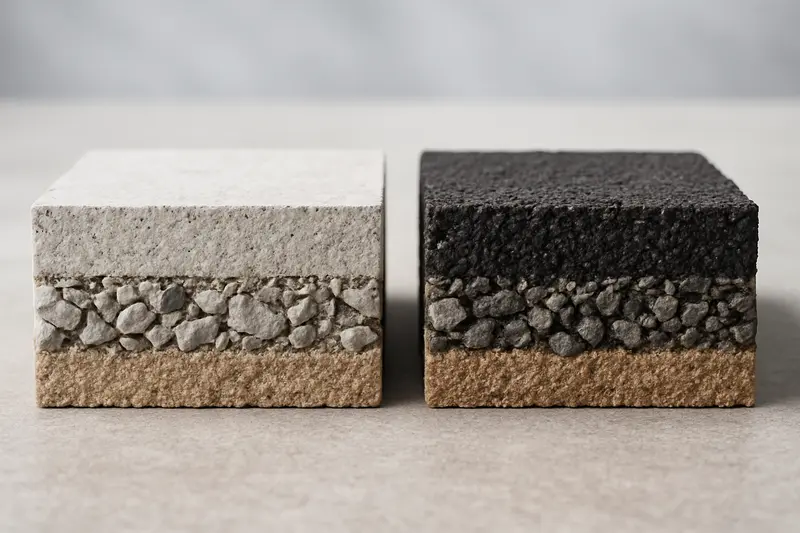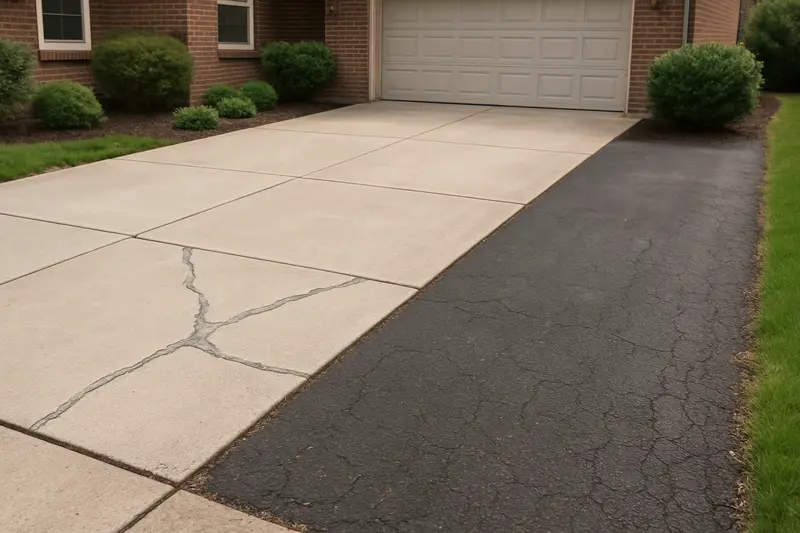Selecting the right material for your driveway is crucial for durability, maintenance, and aesthetics. Concrete and asphalt are two popular options, each with unique benefits and considerations. Homeowners often seek guidance from a qualified Concrete Driveway Contractor to ensure a durable and cost-effective investment. Understanding the technical differences between these materials helps in making an informed decision that suits your climate, budget, and long-term goals.
Material Composition and Structural Differences

A comprehensive understanding of the key distinctions between concrete and asphalt driveways begins with examining their fundamental material compositions and structural frameworks. Concrete is primarily composed of cement, water, and aggregates such as sand and gravel, which, upon mixing, undergo a chemical reaction called hydration. This process results in a rigid, solid matrix that provides high compressive strength and durability. Typically, the concrete is poured into formwork in slabs, with reinforcement such as steel rebar embedded within to enhance tensile strength and resist cracking under load.
In contrast, asphalt is a petroleum-based product, mainly consisting of aggregates mixed with bitumen, a viscous binder. During installation, hot asphalt mixture is spread over prepared subgrades, compacted by rollers to create a dense, flexible pavement. The bitumen acts like a glue, holding the aggregate together, yet allowing for some movement under stress. Structures made from asphalt are generally layered, with a base course, binder layer, and surface layer, each serving specific functions to optimize flexibility and load distribution.
Structurally, concrete’s rigidity makes it well-suited for applications requiring precise, long-lasting surfaces with minimal deformation. Its high modulus of elasticity results in minimal expansion or contraction relative to temperature changes, which contributes to its resistance against cracking. However, this rigidity can also make concrete more vulnerable to cracking if subjected to ground movement or extreme temperature variations.
Asphalt’s inherent flexibility allows it to better absorb and distribute stresses caused by temperature fluctuations, freeze-thaw cycles, and underlying ground shifts. This flexibility reduces the likelihood of cracking but can lead to rutting or surface deformations over time if not properly maintained. Diagrams illustrating these differences often show a cross-section of concrete’s dense, continuous matrix versus asphalt’s layered, multilayered structure, emphasizing concrete’s rigid, monolithic composition against asphalt’s layered, flexible approach.
The installation processes reflect these material differences. Concrete placement involves pouring, screeding, and curing, requiring specialized forms and precise timing to prevent cracking. The curing time can extend over several days, with additional finishing work to achieve a smooth surface. Asphalt installation, however, involves heating the mixture to high temperatures, spreading it promptly, and compacting it to achieve the desired density. This process is generally quicker but necessitates proper temperature control and timely compaction to prevent future issues.
Understanding these material and structural differences is crucial when selecting a driveway material tailored to your specific climate, usage, and maintenance capacity. For instance, areas prone to ground movement or extreme temperature shifts might benefit from asphalt’s flexibility, whereas regions seeking a long-term, low-maintenance solution may prefer concrete’s rigidity and longevity. For a deeper dive into how these materials perform over time, you can visit this resource on understanding the lifespan of a concrete driveway.
Performance, Durability, and Maintenance Considerations

When evaluating both concrete and asphalt driveways, understanding their performance in various weather and load conditions is essential. Concrete generally offers superior durability and resistance to environmental stressors, making it an ideal choice for homeowners seeking a long-lasting solution. Its high compressive strength allows it to withstand heavy loads without significant deformation, which minimizes cracking and surface deterioration over time. Furthermore, concrete’s resistance to moisture ingress reduces vulnerability to freeze-thaw cycles, a common cause of surface damage in colder climates. However, despite its resilience, concrete is not entirely immune to cracking, especially when subjected to ground settlement or improper installation. Cracks in concrete can often be repaired with specialized techniques, extending the lifespan of the driveway, but these repairs require prompt attention and skilled labor to prevent further deterioration.
In contrast, asphalt exhibits a flexible nature that provides advantages in certain weather conditions. Its ability to bend and expand under temperature fluctuations helps mitigate cracking caused by freeze-thaw cycles, especially when properly maintained. Nonetheless, asphalt is more susceptible to surface wear from UV exposure and oxidation, leading to deterioration over time. This often results in the formation of ruts, potholes, or surface raveling, which necessitate regular maintenance. On average, asphalt driveways tend to have a shorter lifespan than concrete—typically around 15 to 20 years—requiring more frequent resurfacing or overlays to maintain performance.
Cost considerations over the lifespan of the driveway reveal notable differences. Concrete’s higher initial installation cost is offset by its lower maintenance needs and longer service life. Conversely, asphalt’s lower upfront expense is complemented by ongoing maintenance costs, such as seal coating every few years and patching repairs to address cracks or potholes. These maintenance activities influence the long-term expenditure associated with each material.
Graphical comparison of durability and maintenance needs (see captioned chart) illustrates that concrete generally offers fewer repairs over a 25-year period, whereas asphalt may require more frequent interventions. Concrete’s resistance to damage reduces repair frequency, while asphalt’s vulnerability to weather and surface wear increases repair and resurfacing occurrences. An illustrative photo (not shown here) of crack repairs on both surfaces highlights the differing repair techniques: epoxy injection and patching for concrete versus seal coating and patching for asphalt.
Considering all these factors, homeowners should evaluate their local climate, budget, and desired driveway lifespan when choosing between concrete and asphalt. For areas with harsh winters and freeze-thaw cycles, concrete’s durability is advantageous. If budget constraints are paramount, asphalt may offer a suitable alternative, provided the homeowner is prepared for ongoing maintenance. To gain a clearer understanding of the typical lifespan and maintenance requirements, consulting reliable resources such as this detailed guide can be beneficial. Selecting the right material requires balancing initial costs with long-term performance, ensuring the driveway remains functional and visually appealing for years to come.
Final words
Choosing between a concrete driveway and asphalt involves assessing long-term durability, maintenance costs, climate adaptability, and aesthetic preferences. Consulting with a skilled Concrete Driveway Contractor ensures the installation meets technical standards and your specific needs. Both materials offer unique advantages, but understanding their technical differences helps homeowners make an informed, strategic decision for their home investment, ensuring a reliable and attractive driveway for years to come.
Get professional help from a trusted Houston Concrete Driveway Contractor today!
Learn more: https://advancedconcretehouston.com/estimate/
About us
Advanced Concrete & Construction – From Concrete Driveways to Commercial Paving, We Do It All. In addition to concrete driveways, advanced Concrete specializes in commercial concrete and asphalt projects. Our commercial projects range from small concrete pads to limestone roads and street paving.
